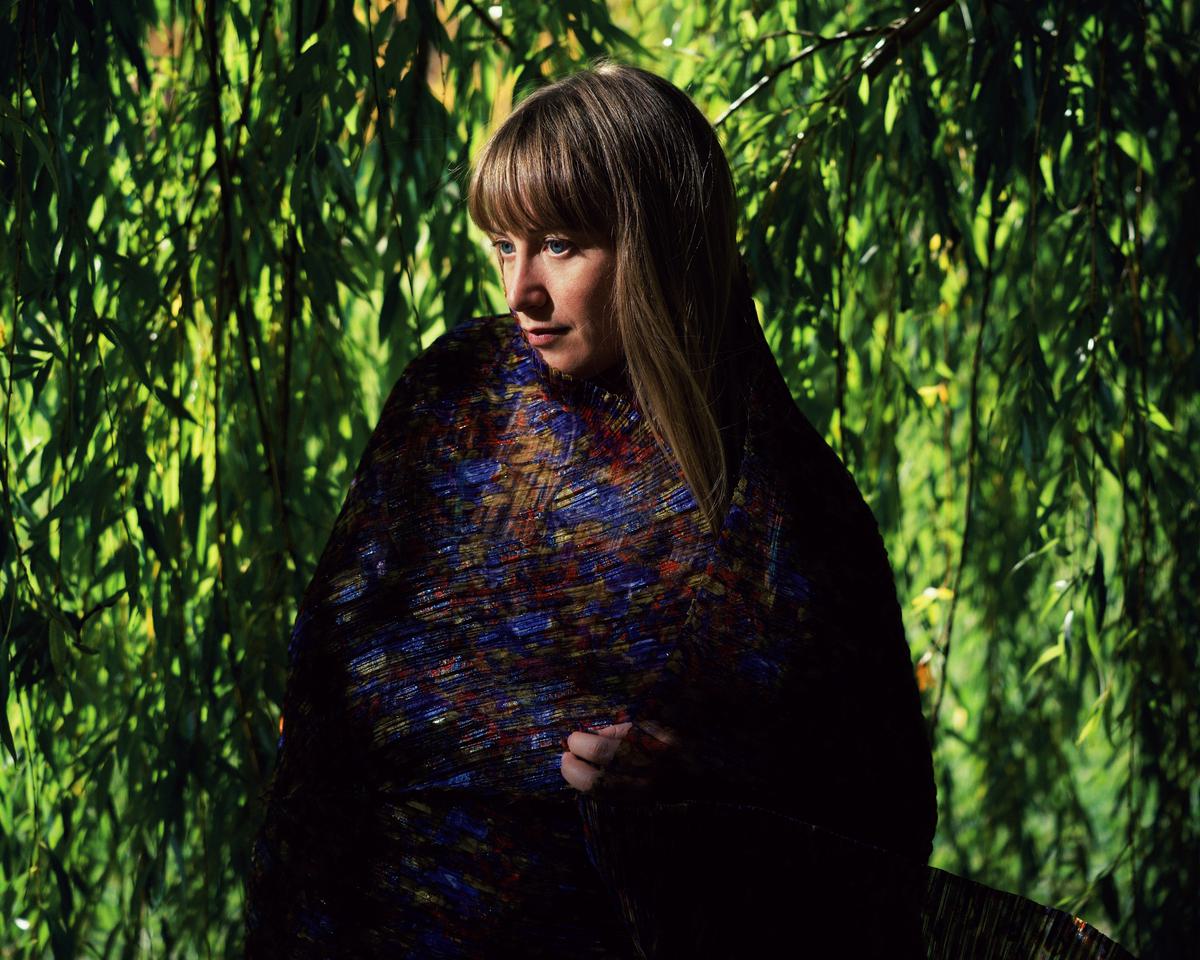
Being a person
Canadian singer/songwriter Tamara Lindeman tells Rick Burin about the mental health crisis that inspired The Weather Station's new record Humanhood – and how she found a path back.
“I was in this place where there’s this disorientation, everything is broken apart, and there’s a part of me that feels that that’s wrong... it needs to be narrative, it needs to make sense, but I can’t make it make sense. With that song, I really did have an awareness that it was showing me the path out.”
Tamara Lindeman, aka The Weather Station, is talking about "Sewing", the final track on her latest LP, Humanhood. And she is talking, too, about the struggles with mental illness that led up to – and in some ways define – the new record. While cast on the wave of success that followed 2021’s pop-folk climate-crisis concept album, Ignorance, she was struggling privately with chronic depersonalisation, a condition in which the mind cuts the cord with the part of the psyche controlling self-identity, effectively disassociating you from yourself. In her case, it served to fracture the world into unreconcilable pieces.
"I was going through a really hard time," she says. "And I would say this was the hardest creative experience I’ve had. To write a record from that space was so difficult, and sometimes I wished I had waited until I was feeling like myself." She considers this for a moment. "But I do feel like…" she continues, "because it came out of that space, it’s more honest than it would have been if I’d started writing it now. I also think, if I started writing it now, I would have written it about something else.
The result is a dense, initially fragmented record: a chronicle of resilience that moves stealthily from chaos to cohesion. That’s where the closing song, "Sewing", comes in. Even by Lindeman’s standards, it is defiantly earnest. It may be the most beautiful thing she has ever written.
"Sometimes a song is a struggle and sometimes it’s a flowing gift," she says. "The moment that concept came into my mind, it was just so easy to write verses." At that point, everything was still in bits. "Then this image of a patchwork quilt came to mind and I thought, ‘That is the metaphor that will bring me through.’"
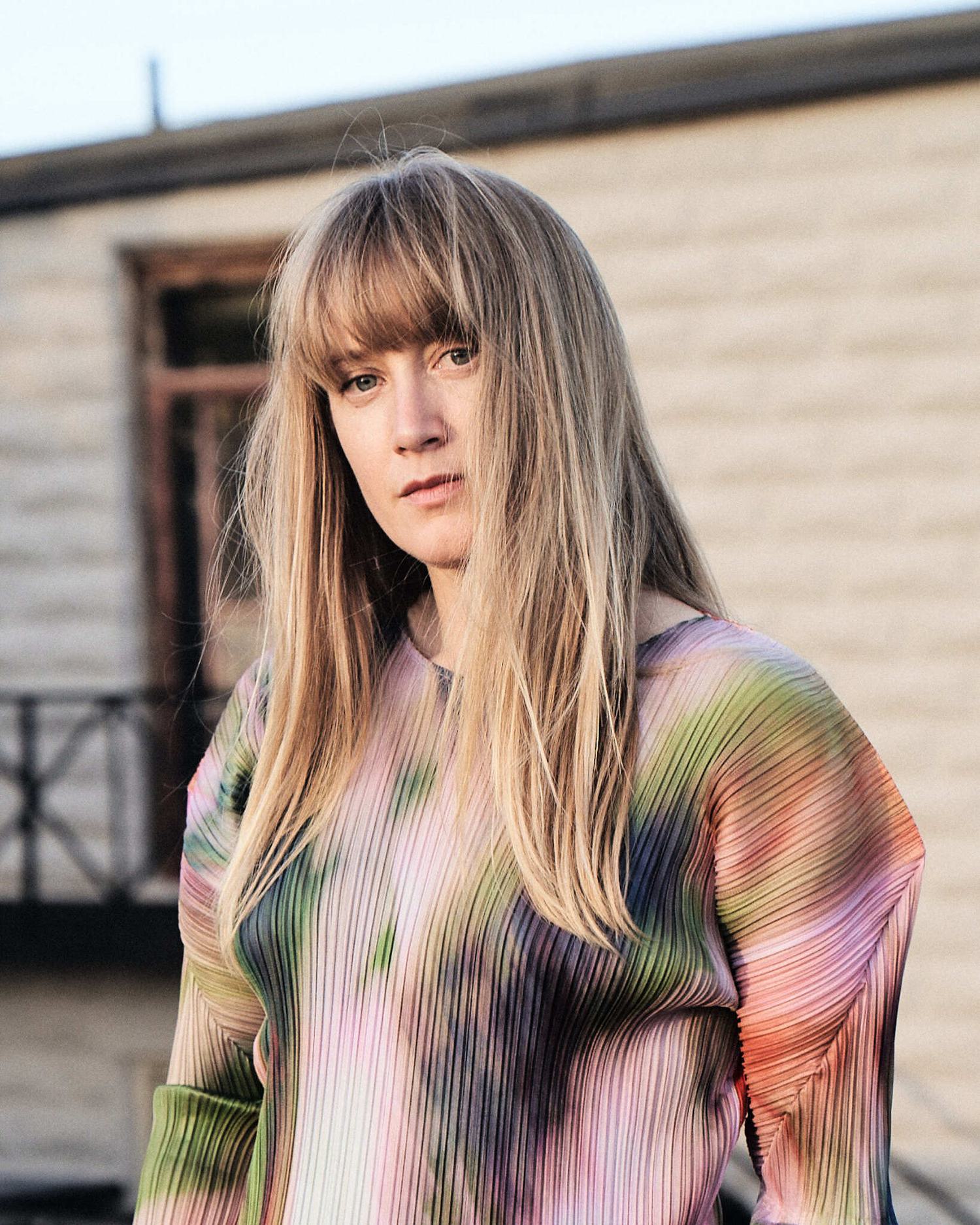
We’re talking via Zoom in the run up to Christmas. Lindeman is at home in Toronto, where she lives by the water. A guitar leans against a wooden wall. Her blonde-brown hair has grown long. She’s doing better now, but it’s not easy. Certainly, the world weighs heavily on her. On record, in interviews, in concert, she talks regularly about the climate, and about ‘climate grief’ – the psychological response to learning what we are doing to the planet. Her songs about social-media culture wars ("Separated"), late-capitalist seduction ("Neon Signs"), and generalised gaslighting ("Sleight of Hand") share a mastery of melody, betraying that same feeling of exhausted oppression.
Does she find it hard to, for want of a better phrase… exist in the world? There’s a pause, before we both start laughing bleakly at this idea. I put it another way: "When you talk about something like climate grief, it feels like those things hit you very hard."
"They really do, yeah," she says, then begins to laugh again, apparently delighted by this new way of articulating her experience: "I do find it hard to exist in the world!" she chuckles. "I mean, I don’t think I’m alone… I’m certainly not." Then, as if considering all this for the first time: "It does hit me really hard. And I think that if it didn’t hit me hard, I would feel that there was something wrong."
Because people have become inured to climate change, she says. "That’s why I wanted to talk about it so much: removing the callus and peeling beneath it. If future generations could see us, they would think that’s all we would talk about. It’s the most consequential thing of all time! And it’s interesting how most people turn off the moment you mention even any part of it. It is hard – those calluses are there because otherwise you wouldn’t be able to get through the day. But there is a psychological cost to not touching the wound, because then you’re living in a form of denial."
Her views on how to proceed as an activist, though, are in flux. "It’s interesting, because in Ignorance era, I would have just said, ‘The thing is to allow yourself to care, so that you’re moved to act.’ But it’s difficult. I’m not so sure of that message right now." Her theory is that recent swings towards right-wing authoritarianism are voters’ sublimated response to their pain over climate change. "I sometimes question: ‘Were there unintended consequences of this moment of awareness that happened a couple of years ago?’" she says. "But" – and here she really starts laughing – "I don’t know… once again, I’m just talking… you asked, like, ‘Does it drive me crazy to be in the world’ and the answer is: ‘Yes!’"
Lindeman is a fascinating person to spend time with. She is entirely open, up to a definite point. She embarks on those deep and unexpected tangents, leaning forward when gripped by a strand of her argument, gesturing animatedly. And she laughs a lot.
She also feels things unusually deeply. She isn’t sure if that sensitivity contributed to the deterioration of her mental health: "I go back and forth between ‘what happened to me was personal’ and ‘I was experiencing a collective crisis internally.’" There’s definitely an interesting parallel, though, she says, between the world as individuals encounter it in 2024, and the psychological splintering she experienced.
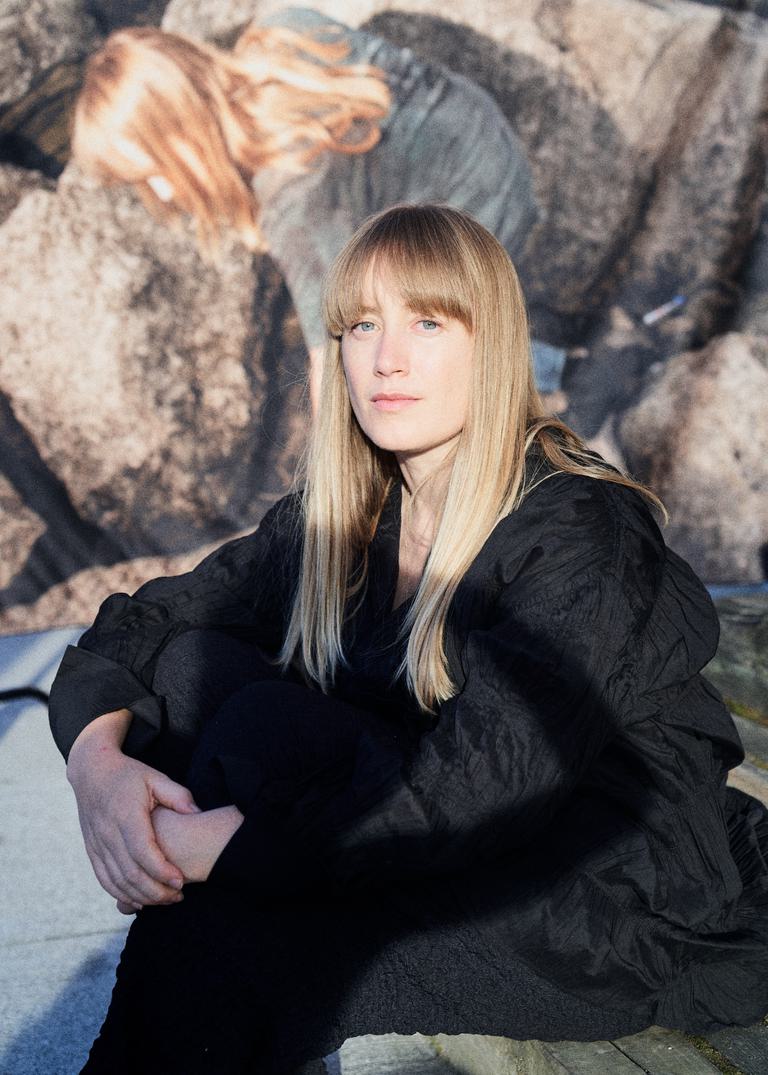
"I’d say that to stay mentally well right now is a struggle," she says. "I’m not saying that what I felt is what people are feeling at the moment. But there are these narrative pieces: ‘We all feel that we’re afraid for the future,’ ‘We can’t count on anything,’ ‘Everything that we care about is being swept away into the dust,’ ‘Everyone is acting strange,’ ‘Nothing feels constant’… You feel this loss of narrative. It seems like the universally stated feeling right now is, ‘I don’t recognise the world, I don’t know what’s happening, I don’t know what the story is.’"
When you consider the climate catastrophe, she says, and then layer on top the political and economic disasters, "it’s amazing that any of us are doing OK." And yet she is, relatively. "There are times when I feel like I have a certain amount of understanding of mental health or I might be able to hold things in my mind, and then there are times when holding that same thing in my mind causes me to not be functioning," she says. "But I think that now, when I’m doing better, and I’m not in that place, I can look at those things and say, ‘OK, this is really bad, I should do something.’ Rather than, when you’re under it, and in that doom-spiral in your head – you can’t pull out."
"Sewing" helped her to pull out. "It’s interesting," she says, "that even the recording of that song was very touched." It was the one time she sang live in the studio with the band. When she finished the take, they just kept playing, and so she just kept singing: five more verses, the ones she’d discarded during the writing process; three ended up on the record.
There is one breathtaking moment in the song where she briefly lowers the quilt metaphor to murmur, "Too late for perfection, to clean up the mess, too late to take it all back, I guess." The lyrics of "Sewing" slip effortlessly between the figurative, the everyday, and the eternal. Is that something she does consciously or just how her mind works? "There is a consciousness of that," she says. "To me it feels like the sweet spot – I don’t feel complete in a song without those three elements. I guess that’s my style, and what my voice is. I always hate when people talk about influences, but in terms of lyrics, I do have a lot of influences that led me to that combination."
Like who? She smiles, "You know, I’ve reflected on this a lot. There’s sort of a Canadian tradition, so when I was coming up in music, I just didn’t realise that writing that way wasn’t the goal." Leonard Cohen is "the grandfather of us all," she says. "And Joni Mitchell does it too: that mixture of ‘I’m going up to this concept and then I’m going down to this story’ – she’s flipping between detail and ideas." Lindeman namechecks others: Bruce Cockburn, Gord Downie from the Tragically Hip.
“I feel like an alien that has come down to Earth and is looking around, going, ‘This doesn’t make any sense.’”

Emboldened by having alighted upon this truth, I decide to air a few other theories about her songwriting. She considers each one at length, before patiently explaining how it is nonsense.
From the outside, I say – thinking about an early classic like "Came So Easy", with its complete lines and simplicity of directness – her lyricism seems to have become increasingly complex over the course of her seven records. "It’s funny," she says politely, "because in some ways I would say it’s getting less complex, as I’ve moved into these songs with fewer words. Since my self-titled album [2017], unfortunately I’ve started really caring about the rhythm of the words, so I’ve left myself with a smaller canvas, which is frustrating. I think that might be my next path out, that I might have to go back to the density-of-words… thing."
"The music is certainly dense now," I say.
She laughs. "Yeah. With this record in particular, I did feel like I was walking a tightrope. I’m paying attention to, for lack of a better phrase, the ‘pop quality’ of a song: how punchy it is, and the dynamic, and the energy levels; but I also was very interested in making everything sound" – her words are overtaken by laughter – "broken and destroyed and chaotic. So those two forces were very in opposition."
On Ignorance, Lindeman broke through commercially by giving free reign to her pop sensibility on tracks such as "Parking Lot" and "Tried to Tell You". She seemed to have catchy tunes coming out of her ears. Since then, on How Is It That I Should Look at the Stars (written at the same time as Ignorance) and this latest record, it feels like she has purposefully stepped back, as if she could still do that, but it’s not necessarily the most interesting thing she could do.
"That’s interesting," she says, by which it turns out she means "incorrect." "I do think that all of the tunes on How Is It and Humanhood are still catchy," she says, "and if I gave them the Ignorance treatment, they’d sound that way. But yeah, I was consciously steering away a bit. I wanted this record to tell a different story and I just felt that if it was too straightforward, it wasn’t as interesting to me. There were ways in which I was obscuring some of the catchier qualities of the actual melody." She grins. "I do tend towards what I think of as catchy songwriting, but maybe that’s an illusion."
One magical aspect of the two most recent records, though, is the time it takes to crack their code – a suggestion Lindeman greets with a satisfied "Mmmmmm." During an era in which the ease of streaming and the pace and forgetfulness of the hype machine demand instant gratification, her abstruseness is a glorious gamble. How Is It That I Should Look at the Stars is perhaps the greatest of her records, and of the decade so far, but it takes a dozen listens to reveal itself. A song like "Stars" isn’t instant, and it feels a little like a secret.
The arrangement that creates that initial barrier – the lack of drums, the ambience of the band – was intended to evoke a very specific feeling. "The whole idea was, ‘we’re falling through space and we never land’ – completely ungrounded," Lindeman explains. "I think that was because the songs were actually pretty straightforward, melodically: they’re peaceful little classic melodies. So I thought I could really push the other dial of letting folks really float on them. Whereas on Humanhood, in ‘Neon Signs’, when the drums come in, it’s like: ‘Boom, we’re grounded, we’re feelin’ solid, we’re moving forward, we know where we’re going.’"
That song, in essence the new album’s opener, is about the exhaustion of being constantly bombarded by a world that wants something from you. Was there a specific impetus, or is that just a general feeling that has been assailing her? She starts laughing again. "Yeah, I mean that’s an everyday thing," she says. "The problem I had with that song was that I just had too many ideas. I felt like I was shoving in five different concepts, but it did work." It draws together advertising, political deceit, and, indeed, any other arena where, as she has put it, "coercion is bound up in the language of love."
"It’s all this same feeling of persuasion," she says. "That line: ‘Nothing needs you so badly as a lie’…" She exhales with an "ouh." "Apparently very accurate, to the world, right now… because people will spend billions just to draw you into their lie."
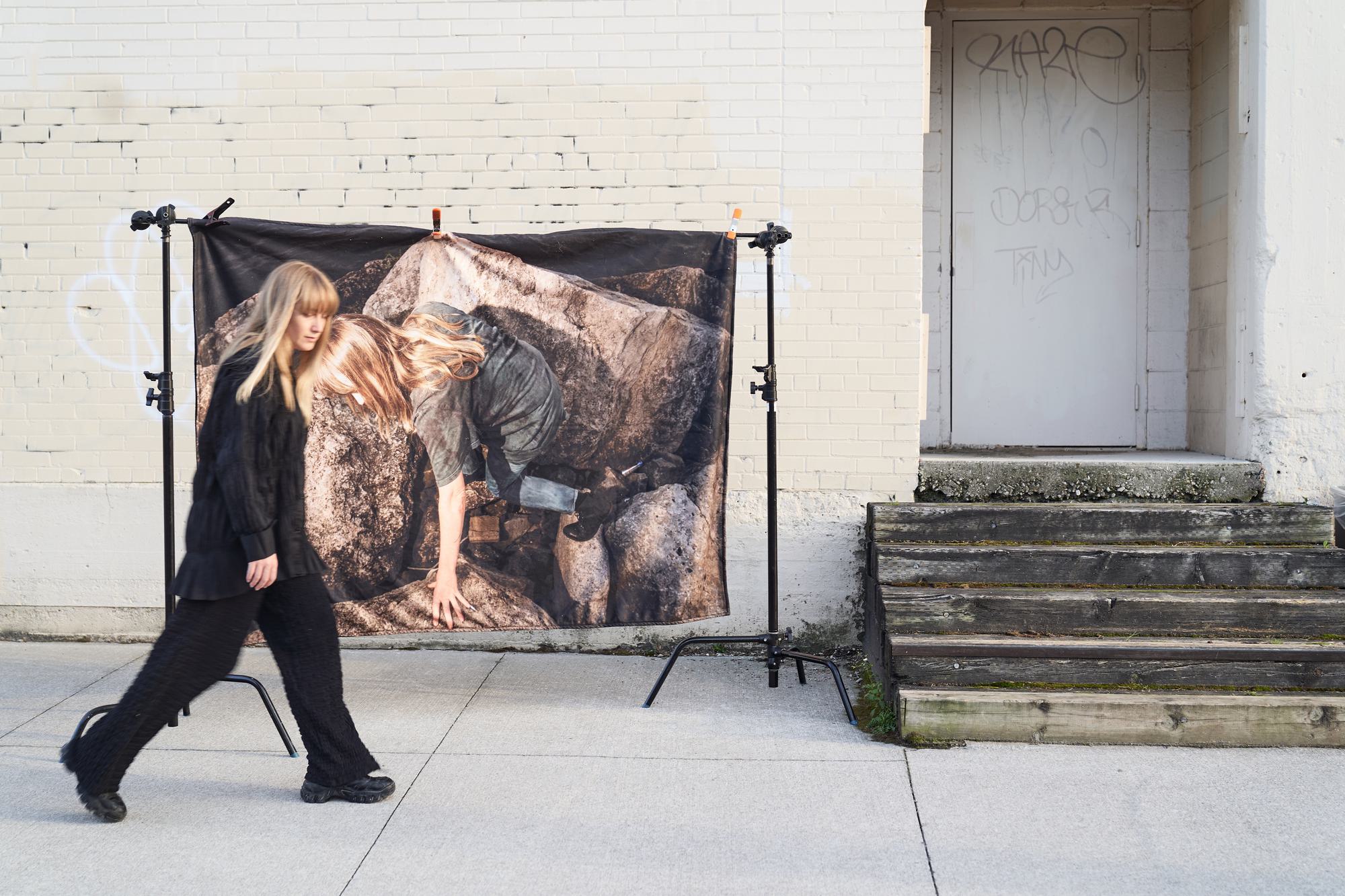
It's another lyric from "Neon Signs", though, that keeps returning to her – one with a very different resonance. "‘Without trust’ is the thing I think I keep thinking about," she says. "I’m now in a relationship in my life where I have trust. I trust the person and they trust me. There’s open communication. And it’s quite amazing. It’s like I’m learning what it’s like to just have the emotional nourishment that everyone needs: of trust, and belonging, and safety. I do think it’s interesting that – on a societal level – we’ve been missing those things for so long that we don’t even know what they feel like. We don’t even know that it’s possible. And when you’re lacking those things, it’s so easy to be caught in fantasies or nightmares. We’re very susceptible to things that are quite fucked up.
That’s also the theme of the penultimate song on Humanhood, the spectral "Lonely", in which love is revealed to be "this thing that usually works – somehow." "It’s not like I had never felt that way before," she says, "but it’s the realisation that actually that was the antidote to the darkness." In the track, she wryly refers to this solution as "a recipe" and an "old wives’ tale," because people had told her it was the answer but, as she says now, she "didn’t know how to believe it." Before the revelation, though, comes the pain, in two lyrics she’s proud to have written: "the smudge I can’t wash off," "the thought I can’t get near to – the place I always disappear to."
"Body Moves" is similarly harrowing but more difficult to grasp. Lindeman says it was hard to commit to recording the song – and then to get it how she wanted. I ask why. She’s laughing again. "Well, it’s fairly confrontational!" she says. "I do have two sides: one that wants to be thoughtful of how I say things to the world, and not rock the boat, and then the demon on my other shoulder that always seems to want me to say the most confrontational or scary thing that’s in my mind." She grins: "And then, of course, you put it out and no-one cares. But I do think this song stuck with me because you can take it in multiple ways: this idea that the body pulls you, the body moves you. I’m not saying that’s it’s good, or that it’s bad. It’s both."
The song is decidedly elliptical, though. It could be about self-harm, or sex. I probe a little but her explanation becomes more, not less, obscure. I’m not clear if she thinks the multiple meanings are obvious, doesn’t want to kill the art by pinning it down, or is declining to disclose something private. "I don’t think it’s as simple as ‘the body always knows best,’" the explanation concludes, "but I do think there’s some kind of ancient energy or wisdom that is there, and it’s difficult – it doesn’t speak English. It’s complicated to figure it out, but you can’t ignore it, I guess, is the only value statement."
We move on to the title of this, her seventh album: Humanhood. What does the word mean to her? "It means a lot to me," she says. "I felt really lucky when I found it: that it was a word that exists but that I hadn’t really heard." She grins. "I mean, I could really go on about it: it would be a few paragraphs."
"Please do," I say.
"It’s just such a strange time to be alive," she says, "and it felt like an opportunity to shine a light on this concept of being a person. That’s partly in the context of AI – and big tech – which feels very strange to me, because it’s so ubiquitous and has obviously been invented by humans, but it’s very anti-human.
"AI, especially, is a technology that feels like it will mostly hurt people, in a myriad of ways. And I find it very odd that we… are people, and we live in a society that doesn’t seem very attuned to our universal needs, or even our universal characteristics." In "Sewing", there is a telling reference to how "some people don’t want to see the seams. They want it all done by machine, straight and plain, no traces of making."
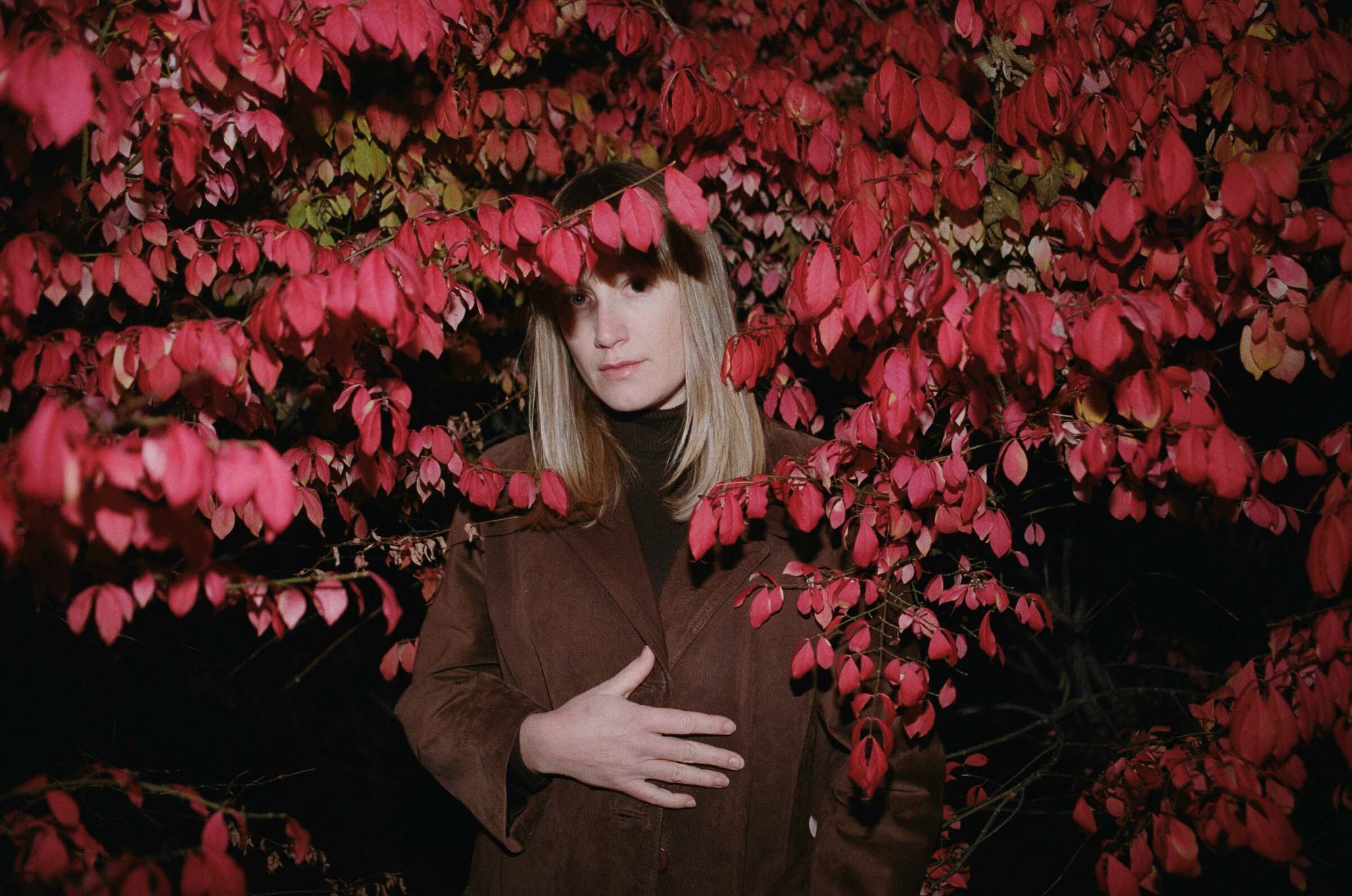
Lindeman says that while the climate movement in which she’s immersed has "a very humanistic worldview." There is an "anti-people sentiment" that shows up on its fringes. "And if you talk to regular people about climate, most of them will pretty quickly get to a place of ‘well, wouldn’t it be better if we just weren’t here,’" she says. "I find it fascinating how often people say that to me, casually. I keep returning to this question of: ‘Why can’t we face ourselves? Why don’t we like ourselves?’ I mean… what is going on? I’ve had this perspective my whole life: I feel like an alien that has come down to Earth and is looking around, going, ‘This doesn’t make any sense.’"
When she came across the word humanhood, she knew it fitted the moment. "I thought, ‘That must be the title of the next album, whatever the next album is.’ I wanted it to be this grand statement of all these things" – she smiles, slips into self-deprecation – "but, of course, it’s just my own personal record." The shrinking lyrical space meant she couldn’t cram in all her ideas in any case. "I really wanna talk about things, but I’m not really giving myself enough space to say everything I wanna say," she says. "And then I was also in love with this dense band."
That five-person band was integral to her unusual concept for the record. "I had this vision of: ‘the songs are islands, and then the music is the stream,’" she says. "I wanted this feeling that you’re in the stream, and then you get out on an island and there’s lyrics, and melody, and then you slip back into the water and you’re carried to the next song in the stream. And the band really resonated with that. I mean, I honestly could make a three-hour record with them just improvising, because they’re beautiful, and I feel so sad that it’s only a couple of minutes that you get of their activity." Humanhood essentially comprises eight songs and five instrumentals (though two toy with the boundary), beginning with the wordless piece, "Descent", which lowers us into the world of the record.
It's a hard album to categorise, Lindeman says: "One of the biggest struggles was that it’s just not a genre. It’s not like it’s brand-new music, but there was this genre-line we had to walk, and it was quite difficult to figure out the sounds, because it’s wasn’t ‘band in a room’ and it wasn’t rock and it wasn’t jazz and it wasn’t country and it wasn’t electronic. It was a weird mix."
As we begin chatting about the sound of the Humanhood track "Mirror", I proceed to mess up the technical side of the call. When I eventually reappear, all flustered, having wasted 10 minutes of her time, I try to apologise. Lindeman’s response is strikingly gentle. "‘Sorry?’" she says, sounding surprised. "No, no, no…"
We turn again to "Mirror", a song that is very funky, before it turns to chaos. "That’s true!" she says, enthused. "The band just was great." She came into the studio with the piano riff and the chord changes, and they did the rest. "I love the bass line, the drums. It’s a hot track!" Its sound seems to first counterpoint and later reflect the words, I say. Again, though, my theory meets with polite resistance. The lyrics and music feel "not unrelated," Lindeman says. "There’s a push-pull, it feels like a conflict to me. What I definitely hear in that song, though, or what I feel we managed to find a way to score, was the shimmer of the light in the lyrics, which is falling on you even if you can’t see it. There’s strings and a lot of searing, very high-frequency synth and then, at the end, I just love the outro where my desire was that the band is all of this conflict and confusion, and it’s falling apart and all that’s left is this shimmering light. That’s my vision – but yeah, you’re right, it is very dark lyrics to a very funky song."
It also houses one brilliantly subversive contention, in which Lindeman half-raps, in a seductive drawl, "I don’t make the rules, I just watch them unfurl." No-one says that, I tell her. Musicians are always claiming that they make the rules.
"Yeah, I really liked that couplet as well," she says. "It feels relevant to…" she starts laughing wearily, "… my life right now."
She begins to talk about how we have to work within the realities of life, about the conversations she’s been having with her partner’s parents – lefties in their seventies or eighties – and of the way we took unprecedented prosperity and social freedom for granted. This discursion ultimately takes in McCarthyism, media in the 1990s, tariffs in the 1920s, the election of FDR, and free speech on the internet. At one point, she says, "I’ve been thinking a lot about the 1890s," which isn’t something you hear a lot of pop stars say. Though she answers the questions I ask, those answers often spin out into ruminations that have clearly been a long time in gestation.
We return to the record. "Ribbon" feels like Humanhood’s moment of transformation – perhaps its heart, certainly its tipping point – at which Lindeman switches from being buffeted by everything to finding a shred of solace. "I do love ‘Ribbon’," she says, referring fondly to it as "this little song," whose refrain she could never quite shake. Its feel is very different to "Neon Signs". "It’s like you’re flailing in the wind," she says.
Whether intentionally or otherwise, she returns to a quilting metaphor to articulate its place on the album. "There are a lot of threads on this record about recognising your vulnerability – recognising that you can be really fucked up – which I think is also in the Humanhood title. And ‘Ribbon’ is really my acknowledgment that I am affected by everything, and I’m sensitive, and things shake me." It culminates by recreating an experience Lindeman had at a place deeply meaningful to her – a fjord in Quebec – where she wandered down over slippery rocks to scoop up salt water and found a French-speaking biker doing the same. "That’s where ‘I’m just like anybody’ came from," she says. "I have to go and touch the water and so does this guy who’s listening to Guns N’ Roses or whatever."
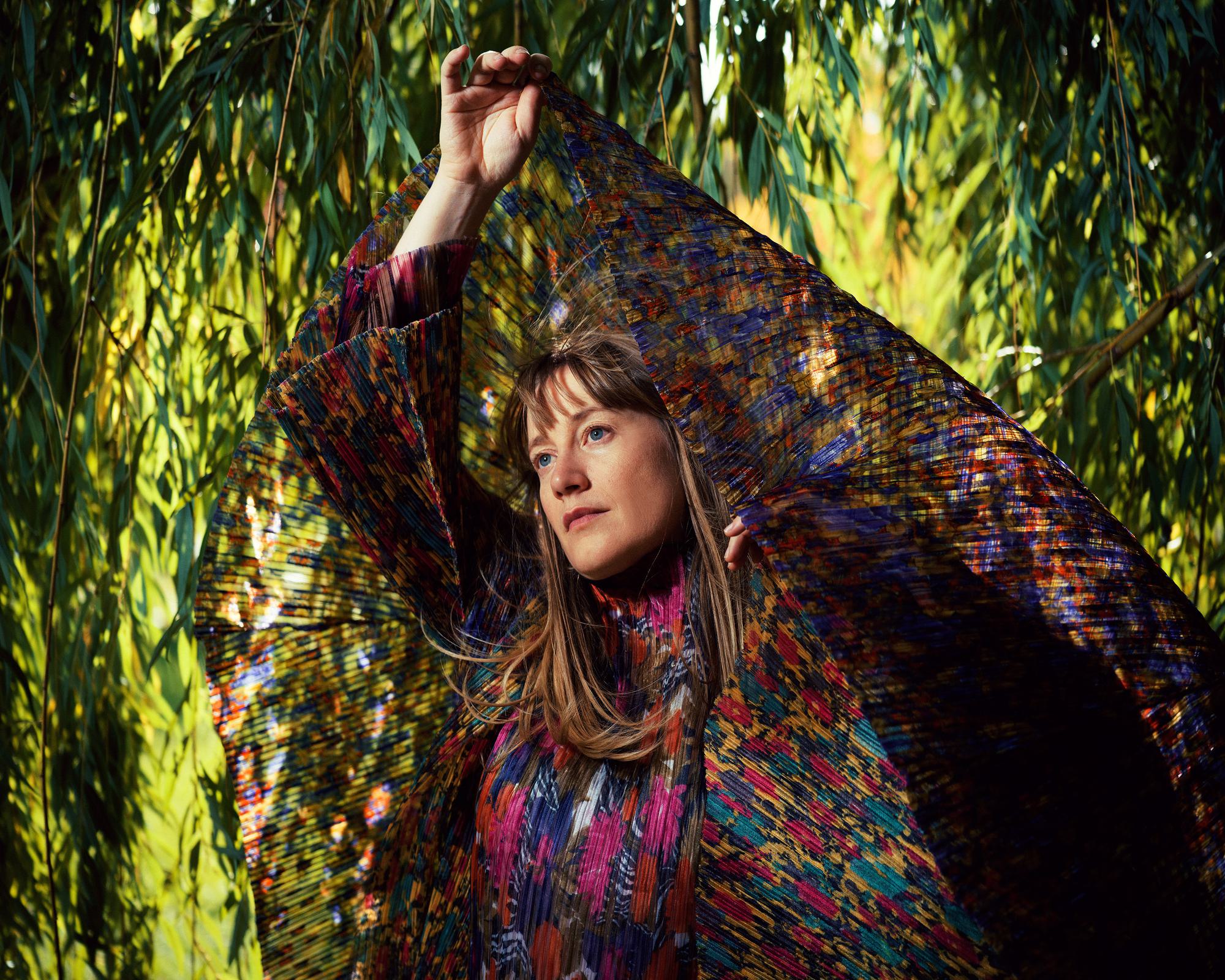
The cleansing and renewing power of nature, and especially of water, are recurring motifs in her work. She lives on a large lake, where she can go swimming, see the horizon and the sky, and get "a different perspective than when you’re hemmed in by the city."
There’s one spot in the city that will always be precious to her, though: a small folk club in Toronto called the Tranzac. She performed there first in 2006 or 2007, following that with a residency where she played once a month for a year. "That’s the club in ‘Lonely’," she explains. "A lot of the music that I’ve been influenced by, and a lot of the musicians that I’ve had come through the band over the years, are Tranzac folks. Toronto has gentrified, and there’s not much space for music, and the Tranzac is fairly ramshackle… I don’t think it’s officially not-for-profit, but it’s certainly not for profit." She laughs. "And it is this oasis," she says. "The front room, the Southern Cross Lounge, which I name-check in the song, is still the space that I think of in terms of, ‘if I was playing this song there, how would it feel?’ It’s like the arbiter of truth to me."
And truth is desperately important to her. When I ask about her acting career, she is devastatingly honest about how her period as a teen actor affected her. Between 1999 and 2015, credited as Tamara Hope, she appeared in around 40 films and TV shows. A few of them, like The Deep End (2001), were excellent; many were not. She has said in the past that she derived little creative satisfaction from simply serving someone else’s vision, but what was the appeal for her initially?
"I mean… I was, like, 13," she says. "And I really hated high school. The appeal was: not going to high school. I was at school in a small town, and, honestly, I was getting bullied because I was weird. I didn’t fit in and I just wanted to be somewhere else. I’d done some plays, so my experience of theatre acting and choir was of a space of acceptance and community and closeness. I felt, ‘I want that,’ and this was just the way that I knew of to pursue it." She winces. "It’s a tough one for me that I still struggle with, where I feel quite humiliated and ashamed of a lot of the things I was in."
There was ultimately a positive side, though. "With time, I’ve reflected on the negative lessons that that work taught me," she says. "I wasn’t allowed to be tired or sad or angry: it was a very controlled, adult setting where you’re awarded for your obedience, you’re rewarded for never saying no. Definitely there’s an element of my life in music is in some ways a response to that." Her first record allowed her to take control of her creative input.
This year, she was able to return to film in a more autonomous way, contributing the song "Moonlight" to Jane Schoenbrun’s trans allegory, I Saw the TV Glow. The director was a fan of Lindeman’s work, and provided her with a precis of the story, as well as some adjectives and colours. "I’d never been asked to do something like that," Lindeman says, "so I was excited. I had that melody from somewhere – it was in some old voice memos." Writing music for movies is usually prescriptive, but when she tried to send the film’s creative team a demo, they told her not to worry about it, to just "go crazy." It’s hard to conceive of a floor that the song couldn’t fill. "I felt like we were really pushing the pop boundary," she says, "which was fun to do."
While the creative control that she has found is satisfying, she says, unexpectedly, that the work remains a struggle. "Every aspect of music is a huge challenge for me," she says. "I find it extremely difficult. I know a lot of people who are just better musicians than me on every conceivable level."
On Humanhood, that challenge made the moments of breakthrough all the more rewarding. "There were a few moments in the mix of this record where we figured out something that just had eluded us for so long, and there’s just like this magic," she says. "There are a few little pieces, like the outro of ‘Mirror’ where I was like, ‘That’s it! That’s exactly the feeling’ and up until that point I’ve never had the resources or the courage to pursue it to the point that we got it. I would have turned off before we got there. So that’s really empowering. And yeah, I am a perfectionist but there’s a few lines where I’m like, ‘I’m proud of that line, and if that’s all I ever put into the world, I could rest on that.’"
"Can you give a couple of examples?" I ask. "I’d love to know what they are."
"Oh, I mean… Yeah, I mean like… I don’t know, now I’m shy…" she says. I’ll look away, I say. She gathers herself: "There’s a couple of songs on How Is It that I’m really proud of. Or those lines in ‘Lonely’ we talked about. Or in ‘Neon Signs’: ‘Nothing needs you so badly as a lie.’ That is something: to stumble across those things feels meaningful – and a gift."
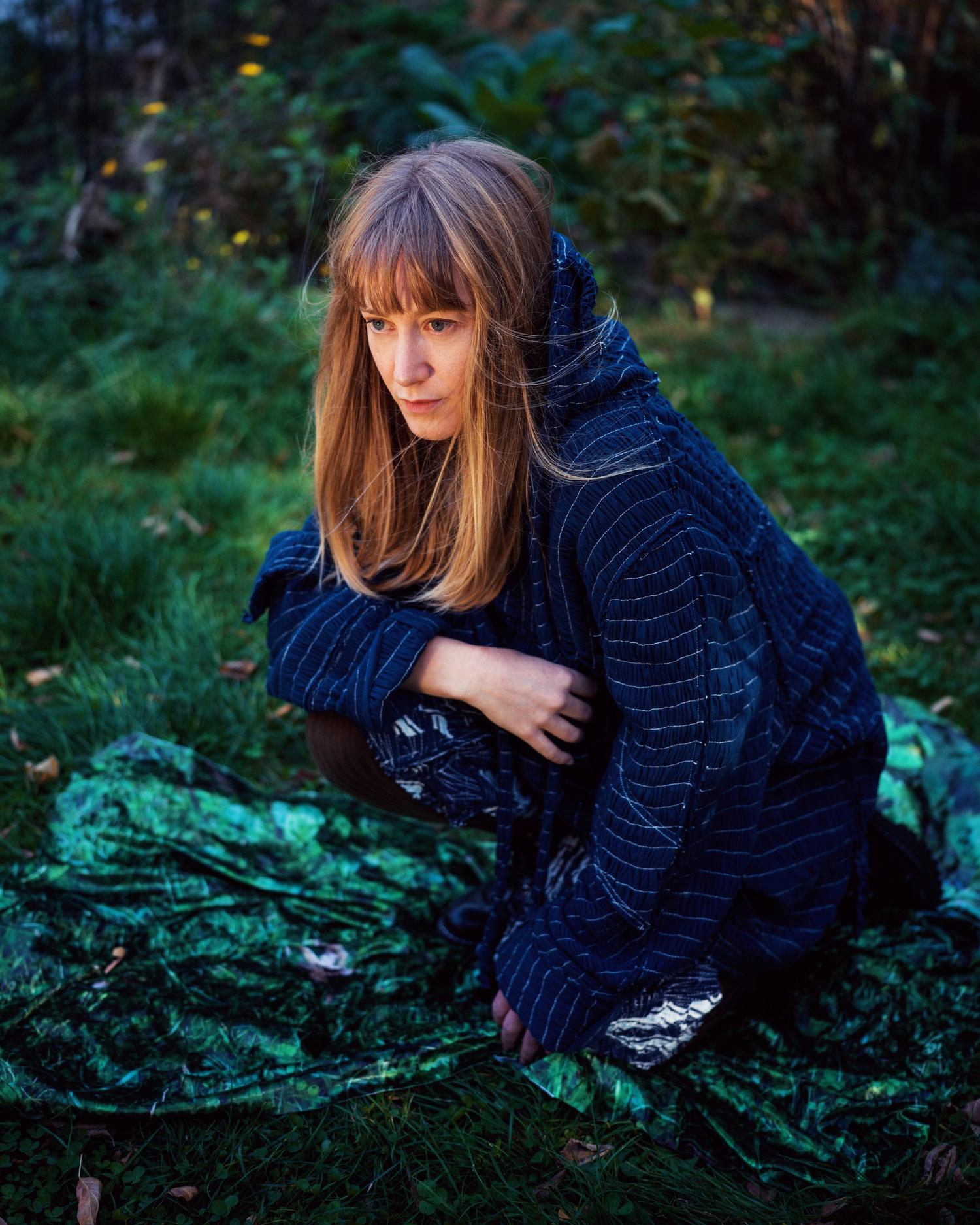
It is a gift, but it is not a panacea. We start to talk about music in the context of mental illness. Arts journalists are obsessed with this convenient idea of art as therapy, I say. But often it doesn’t work like that: sometimes you have to sort out your mental health in practical ways – then you can do your work. She agrees. "What I experience more is that my songs often show me things that aren’t in my consciousness yet. On previous records, there’s definitely situations where the song was trying to tell me something that I didn’t want to hear."
"Which songs are they, that did that for you?" I ask. She squirms slightly. "Oh, I mean, it’s personal…" She deftly changes the subject, talking about her mentoring of other songwriters, and how they’ve experienced the same phenomenon: writing material that told them something upsetting they’d avoided acknowledging.
Then she tells me about "Sewing".
"I think, almost every day, of that line: ‘I know it don’t look like I’m doing anything.’ And then…"
She races embarrassedly through another snippet from the song, then decides that she does feel up to sharing this passage that means so much to her.
She says it slowly this time, and in full, as a smile spreads across her face, and her hands roll one over the other, as if she’s crafting: "‘All I can do is sew it in – to – this undulating thing. Whatever it is that I’m making with you, a life, I’ll sew in that too tonight.’
"That feels so… lovely to me. That’s like… I can rest in that. I can find solace in that."
Get the Best Fit take on the week in music direct to your inbox every Friday

Lorde
Virgin

OSKA
Refined Believer

Tropical F*ck Storm
Fairyland Codex




